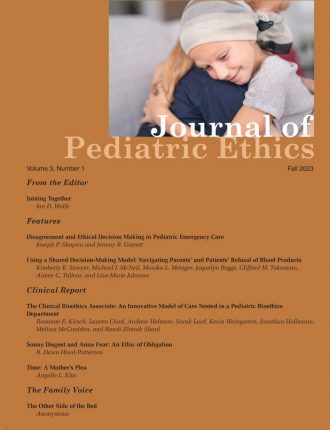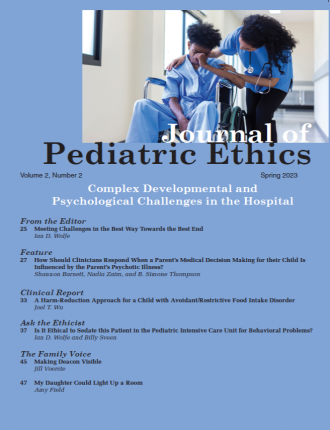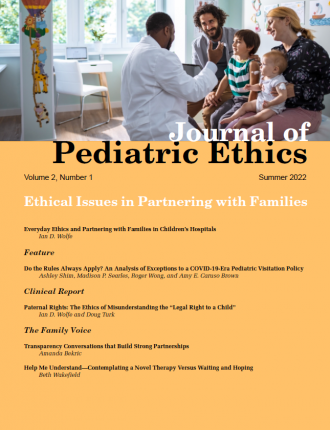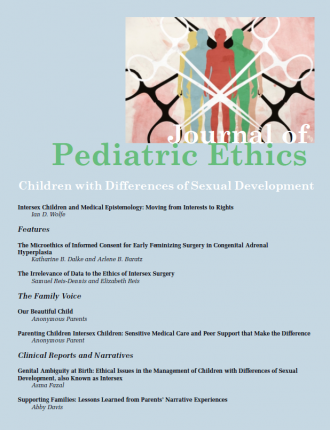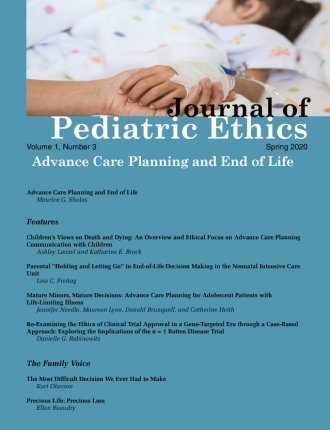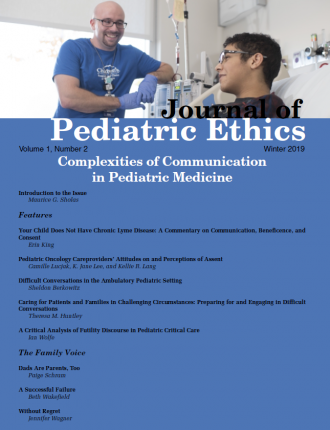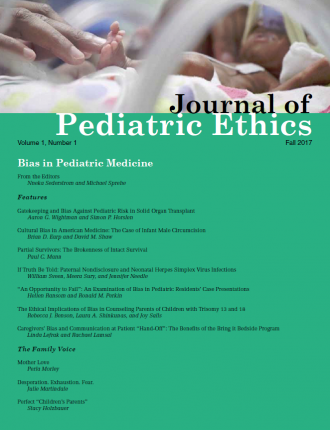The clinical ethics department at Children’s Minnesota is excited to offer the Journal of Pediatric Ethics (JPE). We strive to provide thought leadership through a journal that is dedicated to the ethical complexities that arise in pediatric medicine. Our goal is to provide our readers with thoughtful and inspiring feature articles, highlight original research in the field of pediatric ethics, and promote good clinical practice through extensive case review. Get details on previous issues of the journal.
Go here to connect with us on LinkedIn.com.
Information for authors
If you are interested in being a journal author, go here for details.
Subscription information
- Your subscription to the journal is on an annual basis and will include the two issues for the year.
- Subscription discounts available for ASBH members.
- Once you subscribe, you are automatically enrolled to continue to receive the journals each year.
- To cancel your subscription, you must log into Paypal to do so.
Most recent issue
Fall 2023
References
- Wolfe ID. Joining together. J Ped Ethics. 2023;3(1):3-4.
- Shapiro JP, Garrett JR. Disagreement and ethical decision making in pediatric emergency care. J Ped Ethics. 2023;3(1):5-12.
- Sawyer KE, McNeil MJ, Metzger ML, Boggs J, Takemoto CM, Talleur AC, Johnson L. Using a shared decision-making model: navigating parents’ and patients’ refusal of blood products. J Ped Ethics. 2023;3(1):13-19.
- Kirsch RE, Chad L, Helmers A, Lord S, Weingarten K, Hellmann J, McCradden M, Zlotnik Shaul R. The clinical bioethics associate: an innovative model of care nested in a pediatric bioethics department. J Ped Ethics. 2023;3(1):20-26.
- Hood-Patterson, RD. Sonny Disgust and Anna Fear: An ethic of obligation. J Ped Ethics. 2023;3(1):27-30.
- Klar, AL. Time: A mother’s plea. J Ped Ethics. 2023;3(1):31-35.
- Anonymous. The other side of the bed. J Ped Ethics. 2023;3(1):36-37.
Previous issues
Spring 2023: Complex Developmental and Psychological Challenges in the Hospital
References
- Wofe, ID. Meeting challenges in the best way towards the best end. J Ped Ethics. 2023;2(2):25-26.
- Barnett S, Zaim N, Thompson BS. How should clinicians respond when a parent’s medical decision making for their child is influenced by the parent’s psychotic illness. J Ped Ethics. 2023;2(2):27-34.
- Wu JT. A harm-reduction approach for a child with avoidant/retrictive food intake disorder. J Ped Ethics. 2023;2(2):PP-PP. 35-39.
- Wolf ID, Sveen B. Is it ethical to sedate this patient in the pediatric intensive care unit for behavioral problems? J Ped Ethics. 2023;2(2):40-43.
- Voerste j. Making Deacon visible. J Ped Ethics. 2023;2(2):44-47.
- Field A. My daughter could light up a room. J Ped Ethics. 2023;2(2):48-49.
Summer 2022: Ethical Issues in Partnering with Families
References
- Wolfe ID. Everyday ethics and partnering with families in children’s hospitals. J Ped Ethics. 2022;2(1):3-5.
- Ashley Shim A, Searles MP, Wong R, Caruso Brown AE. Do the rules always apply? An analysis of exceptions to a COVID19-era pediatric visitation policy. J Ped Ethics. 2022;2(1):6-14.
- Wolfe ID, Turk D. Paternal rights: the ethics of misunderstanding the “legal right to a child”. J Ped Ethics. 2022;2(1):15-18.
- Bekric A. Transparency conversations that build strong partnerships. J Ped Ethics. 2022;2(1):19-20.
- Wakefield B. Help me understand — contemplating a novel therapy versus waiting and hoping. J Ped Ethics. 2022;2(1):21-22.
Spring 2021: Children with Differences of Sexual Development
References
- Wolfe ID. Intersex children and medical epistemology: moving from interests to rights. J Ped Ethics. 2021;1(4):147-149
- Dalke KB, Baratz AB. The microethics of informed consent for early feminizing surgery in congenital adrenal hyperplasia. J Ped Ethics. 2021;1(4):150-161.
- Samuel Reis-Dennis S, Reis E. The irrelevance of data to the ethics of intersex surgery. J Ped Ethics. 2021;1(4):162-164.
- Anonymous parents. Our beautiful child. J Ped Ethics. 2021;1(4):165-168.
- Anonymous parent. Parenting children intersex children: sensitive medical care and peer support that make the difference. J Ped Ethics. 2021;1(4):169-170.
- Fazal A. Genital ambiguity at birth: ethical issues in the management of children with differences of sexual development, also known as intersex. J Ped Ethics. 2021;1(4):171-174.
- Davis A. Supporting families: lessons learned from parents’ narrative experiences. J Ped Ethics. 2021;1(4):175-177.
Spring 2020: Advance Care Planning and End of Life
References
- Sholas MG. Advance care planning and end of life. J Ped Ethics. 2020;1(3):99-100.
- Ashley Lanzel A, Brock KE. Children’s views on death and dying: an overview and ethical focus on advance care planning communication with children. J Ped Ethics. 2020;1(3):101-112.
- Freitag LC. Parental “holding and letting go” in end-of-life decision making in the neonatal intensive care unit. J Ped Ethics. 2020;1(3):113-124.
- Needle J, Lyon M, Brunquell D, Heith C. Mature minors, mature decisions: advance care planning for adolescent patients with life-limiting illness. J Ped Ethics. 2020;1(3):125-130.
- Rabinowitz DG. Re-examining the ethics of clinical trial approval in a gene-targeted era through a case-based approach: exploring the implications of the n = 1 Batten disease trial. J Ped Ethics. 2020;1(3):131-139.
- Olavson K. The most difficult decision we ever had to make. J Ped Ethics. 2020;1(3):140-141.
- Beaudry E. Precious life; precious loss. J Ped Ethics. 2020;1(3):142-143.
Winter 2019: Complexities of Communication in Pediatric Medicine
References
- Sholas MG. Introduction to the issue. J Ped Ethics. 2019;1(2):63-64.
- King E. Your child does not have chronic Lyme disease: a commentary on communication, beneficence, and consent. J Ped Ethics. 2019;1(2):65-67.
- Lucjak C, Lee KJ, Lang KR. Pediatric oncology careproviders’ attitudes on and perceptions of assent. J Ped Ethics. 2019;1(2):68-74.
- Berkowitz S. Difficult conversations in the ambulatory pediatric setting. J Ped Ethics. 2019;1(2):75-78.
- Huntley TM. Caring for patients and families in challenging circumstances: preparing for and engaging in difficult conversations. J Ped Ethics. 2019;1(2):79-81.
- Wolfe I. A Critical analysis of futility discourse in pediatric critical care. J Ped Ethics. 2019;1(2):82-90.
- Schram P. Dads are parents, too. J Ped Ethics. 2019;1(2):91-92.
- Wakefield B. A successful failure. J Ped Ethics. 2019;1(2):93-94.
- Wagner J. Without regret. J Ped Ethics. 2019;1(2):95-96.
Fall 2017: Bias in Pediatric Medicine
References
- Sederstrom N, Sprehe M. From the editors. J Ped Ethics. 2017;1(1):3.
- Wightman AG, Horslen SP. Gatekeeping and bias against pediatric risk in solid organ transplant. J Ped Ethics. 2017;1(1):4-7.
- Earp BD, Shaw DM. Cultural bias in American medicine: the case of infant male circumcision. J Ped Ethics. 2017;1(1):8-28.
- Mann PC. Partial survivors: the brokenness of intact survival. J Ped Ethics. 2017;1(1):29-33.
- Sveen W, Sury M, Needle J. If truth be told: paternal nondisclosure and neonatal herpes simplex virus infections. J Ped Ethics. 2017;1(1):34-37.
- Ransom H, Perkin RM. “An opportunity to fail”: an examination of bias in pediatric residents’ case presentations. J Ped Ethics. 2017;1(1):38-42.
- Benson RJ, Shinkunas LA, Salls J. The ethical implications of bias in counseling parents of children with Trisomy 13 and 18. J Ped Ethics. 2017;1(1):43-47.
- Linda Lefrak L, Lamsal R. Caregivers’ bias and communication at patient “hand-off”: the benefits of the Bring it Bedside Program. J Ped Ethics. 2017;1(1):48-53.
- Morley, P. Mother love. J Ped Ethics. 2017;1(1):54.
- Martindale J. Desperation. Exhaustion. Fear. J Ped Ethics. 2017;1(1):55-57.
- Holzbauer S. Perfect “children’s parents”. J Ped Ethics. 2017;1(1):58-59.
Instructions for authors
Journal of Pediatric Ethics mission
The mission of the Journal of Pediatric Ethics (JPE) is to aid in the caring of children by creating a journal dedicated to the ethical complexities that arise in pediatric medicine. Our goal is to provide an educational periodical that will feature thoughtful and inspiring articles, highlight original research in the field of pediatric ethics, and promote good clinical practice through extensive case review.
Editorial disclaimer
The content of the Journal of Pediatric Ethics (JPE) represents only the opinions of the authors and editorial body of the periodical. The opinions and perspectives published do not necessarily represent the views of others within Children’s Minnesota or any other institution or organization represented or affiliated with our editorial advisory board.
The goal of JPE is the provide a space to have thought provoking and educational articles around the care of children and provide its readers with practical guidance for good clinical decision making. All feature articles are peer-reviewed. All copy is internally reviewed by our Editorial Advisory Board and members of our editorial group. Cases submitted for publication will not have identifiable personal information. Any PHI will be removed or changed to obscure patient, surrogate, and clinician identities. Although the cases may reflect actual experiences, for this publication they are more accurately composites that are hypothetical and are created strictly for the purpose of teaching and intellectual discourse.
Editorial policy
All contributions to the Journal of Pediatric Ethics will be peer reviewed with the understanding that the submission has not been placed under consideration, accepted for publication, or in print elsewhere. Decisions of acceptance or rejection will be based on peer review recommendations and at the discretion of the editorial group. All authors of accepted material will be required to assign copyright to the publisher prior to release.
Photocopy and reprint permissions
No part of this journal may be reproduced by any process or technique without written permission. For reprint permission, please contact [email protected].
Letters to the editor
All comments are welcome and should be addressed to the Editor-in-Chief, Ian Wolfe, at [email protected]. Letters should not exceed 500 words.
Submission guidelines
Submissions of completed manuscripts for publication consideration must follow the approved guidelines:
- Manuscripts must be submitted in Word format or as a rich text file
- All submissions must follow the Chicago Manual of Style, 17th Edition
- Article submissions should not exceed 5,000 words
- All original research should include IRB and other ethics review board approval
- All articles must be electronically submitted to [email protected].
The Journal of Pediatric Ethics will be published by volume with each volume consisting of 2 issues. Subscriptions are for the entire volume and will be renewed annually.
